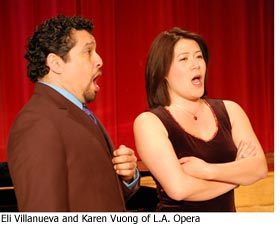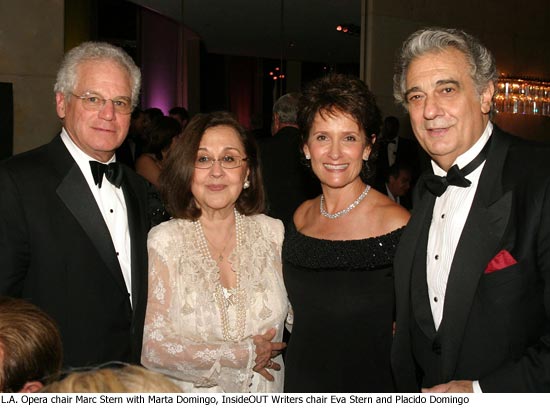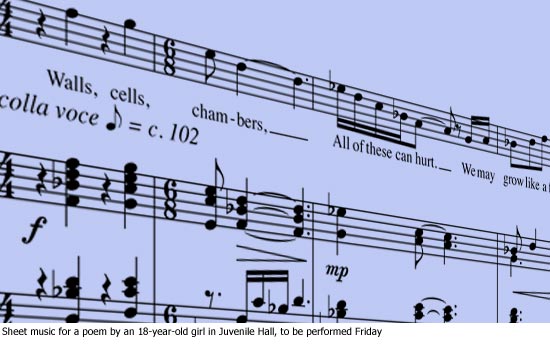Teen tragedy, set to music
March 24, 2010
Eli Villanueva is driving with his girlfriend in Burbank when they come upon two people on a bridge over the 5 Freeway.
The young man looks ready to jump. The young woman beside him is trying to restrain him.
“She was desperate. She was hysterical and really trying to hang on,” Villanueva remembers. “I had stopped the car and went over to see if I could offer some assistance…As I get there, the young man sees me.” Villanueva reaches out, clasps the young man’s hand and helps pull him back from the brink.
That split-second, adrenalin-pumping moment of human contact took place two years ago. Earlier this month, Villanueva felt those emotions rush back, confronted again with the traumas of youth in a different and unexpected context.
As resident stage director for LA Opera’s education and community programs, he was at work on an unusual project to turn poetry by teens in Central Juvenile Hall into songs to be performed by opera singers. He’d come across a poem called “Safe.”
Something that seemed like an ordinary day
Started off as promising but ended wrong in every way
Driving pretty fast in my Mercedes goin 80
As I come along the bridge and see a
young girl on a stump going crazy,
steppin to the edge while rocks are tumblin
off the road, and as I read the sign ahead
we’re 200 ft in the air is what I’m told.
Using my first mind I got out of the car
and started preachin. Next thing I know
I’m walking towards a person and I’m reachin.
My hands extended, my tears on edge,
all I can do is pretend that this person
is not my baby sister, about to reach her end…
“Safe,” with music by Villanueva and lyrics by a girl known to him only by her age and housing unit, gets its world premiere Friday. It’s one of four original songs to be performed at a Central Juvenile Hall “writers retreat” featuring the unlikely pairing of LA Opera and InsideOUT Writers, a nonprofit program that teaches creative writing to kids in L.A. County’s juvenile hall system.
It’s an improbable partnership but maybe not such a stretch.
“Here are the central themes of these kids’ lives: violence, death, guns, gangs, dead homies, beloved mothers, absent fathers…Tragedy. Which is perfect for opera,” says Sheri Lin, writing program director at InsideOUT.
 For the opera collaboration, Lin selected 11 poems written by students in 2008 and 2009. Villanueva ended up setting four of them to music.
For the opera collaboration, Lin selected 11 poems written by students in 2008 and 2009. Villanueva ended up setting four of them to music.
From the beginning, “Safe” stood out.
“That one affected most of us when we read it,” Villanueva says. “When I read it, I was actually a little bit afraid of it”—particularly about the challenge of capturing the 18-year-old girl’s perspective that is essential to the piece.
“It takes you on an arc,” he says. “It’s light at first. It’s lilting. And then from there, it doesn’t get violent, it doesn’t get tragic–it actually becomes sympathetic and touching and quite still.”
Then there was “If I Played My Song Backwards,” written by a 17-year-old boy.
“When I first read it, I said this is already a song,” Villanueva says.
If I played my song backwards I’d get—
a life
a love
& new best friends
a dog
a boy
The song never ends
a mom
her mom
the loves of my life
my moe
my truck
I’d feel all my strife
my bro
my school
how I miss these days
my lungs
my health
my life’s gone a blaze
my barbies
my binky
The days left unheard
That’s what you’d get when you play my song backwards.
Those words conveyed longing and regret—and like the other poems, seemed to offer a transcendent message for Villanueva to set to music.
“I’m really trying to relate to the moments which they are describing,” Villanueva says. “Some of these things that they are feeling can be quite universal…Sometimes what I read will bring up pictures in my own life.”
It would have been easy to verge into rap or beatbox stylings. But Villanueva took another musical route, channeling “a French-flavored waltz” in “If I Played My Song Backwards,” for example.
“If you played the melody with an accordion,” he says, “you’d be in Paris.”
“What my hope was to take the words that they came up with to see if I could translate them in an artistic way–but not too far away from what I thought would connect with them,” he says. “Not too artsy-fartsy.”
Villanueva didn’t just write the music; he’ll perform at Juvenile Hall on Friday, along with soprano Karen Vuong and pianist Daniel Faltus.
Also on the program are some classics from the operatic and musical theater, such as the “Largo al factotum” from Rossini’s “Barber of Seville” and “La chi darem la mano,” a duet from Mozart’s “Don Giovanni.”
And that will almost certainly be a first for most in the audience, Lin says.
“I’m sure a lot of the kids are not going to know what opera it is,” she says. But “they’re going to take a kid’s writing and set it to music. That’s going to ensure a connection.”
“My hope is that it will be this phenomenal experience for everybody involved,” she adds. The Juvenile Hall kids “are the tragedies of our society today. Their stories need to be heard. This is a medium for their stories to be heard.”
The marriage of opera and InsideOUT originated with philanthropist Eva Stern, who’s underwriting the Juvenile Hall program.

As the wife of LA Opera chairman and CEO Marc I. Stern (“He’s the opera lover; I’m the opera liker”), Eva Stern is no stranger to black tie galas and hobnobbing with the likes of Plácido Domingo, the opera’s general director.
But she’s also the chair of InsideOUT’s board, and serves on the board of organizations including the Center Theater Group’s education committee and Alliance Charter Schools. So she’s seen first-hand the power of exposing children to fine art, whether it’s a field trip to “Frost/Nixon” at the Ahmanson or a visit by opera singers to the Stern Math and Charter School on the campus of Cal State LA.
“These are kids who won’t even have heard of ‘Westside Story,’ ” Stern says. “It’s not about making them opera lovers; it’s giving them exposure to something. Any vehicle is the right vehicle if it is done keeping the audience in mind.”
And if this particular mash-up shatters some preconceptions, so much the better.
“Considering that the world thinks of opera as very high brow,” Stern says, “it’s important to know that opera is out there in the community and educating.”
Posted 3/24/10















 405 bridge work causes a stink
405 bridge work causes a stink